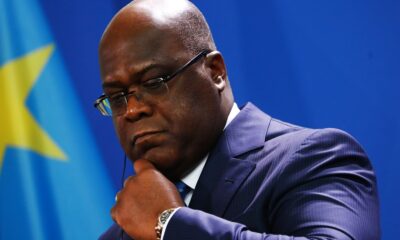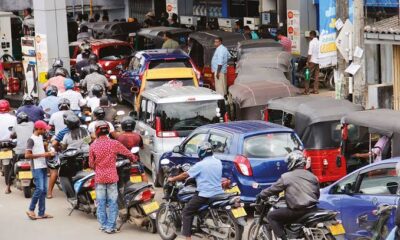Strictly Personal
Dollar to watt? Uganda should pay for its imports with energy by Joachim Buwembo
Published
2 years agoon

One German said that before the war, they used to carry money in the pocket to go buy food in baskets, later they ended up taking money in baskets to bring food in the pocket. Now, the Ukraine-born inflation is driving us all in that direction and countries are devising different solutions.
Kenya’s President Uhuru Kenyatta is digging into the government’s (still) deep pocket to subsidize petroleum products. But departing presidents tend to be generous: in the US they even donate life to death row convicts.
But in Uganda, Comrade Museveni, who still has four years on his contract, is giving us tough love, not candy that causes tooth decay and teenage obesity. He said NO to injecting Uganda’s limited funds in a bad (petroleum) sector that is polluting and ruining the planet, and advised us to go electric.
Earlier in the same cost of living regard, Museveni advised Ugandans to switch from bread (imported wheat) to cassava (which grows casually in Uganda’s soil and can be preserved free of charge by sun drying, besides its having no fixed harvest time – just leave it in the ground as it grows bigger and bigger till you harvest only those tubers you need to eat that day).
At first many thought the president was joking, but soon enough started taking his advice seriously and now cassava is becoming trendy, as class-conscious and enterprising Ugandans innovate ways of preparing it. The easiest and probably healthiest way so far is simply boiling a few slices with a little salt and an onion – it gets ready in a few minutes like an egg – and your breakfast is sorted. If we don’t see bread from cassava in Kampala’s supermarkets soon, I’ll eat my hat, sorry my cassava.
So Ugandans may continue carrying money in wallets to buy food in baskets, not money in the baskets to bring food in wallets. But it takes discipline and creativity. When Museveni first took power in 1986, he attempted to tackle Uganda’s import needs by offering to exchange the country’s agricultural produce for industrial products.
It was working. We even got a fleet of Peugeot pick-up trucks from France in exchange for our coffee. Uganda was finally getting real value for value, but the owners of the dollar system of exchange were not amused. They killed the system and even sabotaged a barter deal with a country that is one of Uganda’s closest allies, and we were back to slavery to the dollar.
The solution — manufacturing key industrial goods, including equipment like vehicles — is ongoing beyond talk and Uganda-designed and built electric buses have been taking to the road since 2019, so the needs-driven creativity of 1986 is back through manufacturing, beyond trade.
As we continue to do our own thinking instead of leaving it to the “3 Bs” — from Bretton, through Brussels to Beijing — we should rethink the currency concept by looking at energy to take the place of money. Because energy is vital for powering human life, industry, transport and homes, Europeans are toning down on the names they were calling Vladmir Putin as winter approaches. No need to belabor that point.
Uganda can plan to use energy to (partially at first) to replace shillings, euros and dollars. Telephone credit and internet data are already an intangible value, measured in minutes and bytes, though still expressed in money. But Uganda doesn’t own these, they are from, and for, developed world companies. What we own is energy in different forms, the most measurable being electricity.
The “good” thing is that we have recklessly cut down the trees that provide firewood and charcoal, used by most of our people for cooking. In a decade, Ugandan peasants will cook with firewood imported or stolen from Congo. But we have huge electricity generating potential and are hardly using half of the installed capacity. So the domestic market can start switching from transacting using shillings and dollars to watts.
The best brains overseas are busy scratching their computers to make digital currencies replace the present-day money. Let us monetise energy, with tangible value unlike crypto things, by turning it into something like what phone time or internet data has become.
We have the computing capacity to figure out how. And the opportunity.
You may like
-


Air Peace, capitalism and national interest, By Dakuku Peterside
-


This is chaos, not governance, and we must stop it, By Tee Ngugi
-


Off we go again with public shows, humbug and clowning, By Jenerali Uliwengu
-


How patriarchy underpins gender violence today, By Tee Ngugi
-


Help! There’s a dangerous, secret plot to save the EAC from imminent death, By Charles Onyango-Obbo
-


How South Africa, US elections could shape Tshisekedi’s bread in Kinshasa, By Charles Onyango-Obbo
Strictly Personal
Air Peace, capitalism and national interest, By Dakuku Peterside
Published
4 days agoon
April 16, 2024
Nigerian corporate influence and that of the West continue to collide. The rationale is straightforward: whereas corporate activity in Europe and America is part of their larger local and foreign policy engagement, privately owned enterprises in Nigeria or commercial interests are not part of Nigeria’s foreign policy ecosystem, neither is there a strong culture of government support for privately owned enterprises’ expansion locally and internationally.
The relationship between Nigerian businesses and foreign policy is important to the national interest. When backing domestic Nigerian companies to compete on a worldwide scale, the government should see it as a lever to drive foreign policy, and national strategic interest, promote trade, enhance national security considerations, and minimize distortion in the domestic market as the foreign airlines were doing, boost GDP, create employment opportunities, and optimize corporate returns for the firms.
Admitted nations do not always interfere directly in their companies’ business and commercial dealings, and there are always exceptions. I can cite two areas of exception: military sales by companies because of their strategic implications and are, therefore, part of foreign and diplomatic policy and processes. The second is where the products or routes of a company have implications for foreign policy. Air Peace falls into the second category in the Lagos – London route.
Two events demonstrate an emerging trend that, if not checked, will disincentivize Nigerian firms from competing in the global marketplace. There are other notable examples, but I am using these two examples because they are very recent and ongoing, and they are typological representations of the need for Nigerian government backing and support for local companies that are playing in a very competitive international market dominated by big foreign companies whose governments are using all forms of foreign policies and diplomacy to support and sustain.
The first is Air Peace. It is the only Nigerian-owned aviation company playing globally and checkmating the dominance of foreign airlines. The most recent advance is the commencement of flights on the Lagos – London route. In Nigeria, foreign airlines are well-established and accustomed to a lack of rivalry, yet a free-market economy depends on the existence of competition. Nigeria has significantly larger airline profits per passenger than other comparable African nations. Insufficient competition has resulted in high ticket costs and poor service quality. It is precisely this jinx that Air Peace is attempting to break.
On March 30, 2024, Air Peace reciprocated the lopsided Bilateral Air Service Agreement, BASA, between Nigeria and the United Kingdom when the local airline began direct flight operations from Lagos to Gatwick Airport in London. This elicited several reactions from foreign airlines backed by their various sovereigns because of their strategic interest. A critical response is the commencement of a price war. Before the Air Peace entry, the price of international flight tickets on the Lagos-London route had soared to as much as N3.5 million for the economy ticket. However, after Air Peace introduced a return economy class ticket priced at N1.2 million, foreign carriers like British Airways, Virgin Atlantic, and Qatar Airways reduced their fares significantly to remain competitive.
In a price war, there is little the government can do. In an open-market competitive situation such as this, our government must not act in a manner that suggests it is antagonistic to foreign players and competitors. There must be an appearance of a level playing field. However, government owes Air Peace protection against foreign competitors backed by their home governments. This is in the overall interest of the Nigerian consumer of goods and services. Competition history in the airspace works where the Consumer Protection Authority in the host country is active. This is almost absent in Nigeria and it is a reason why foreign airlines have been arbitrary in pricing their tickets. Nigerian consumers are often at the mercy of these foreign firms who lack any vista of patriotism and are more inclined to protect the national interest of their governments and countries.
It would not be too much to expect Nigerian companies playing globally to benefit from the protection of the Nigerian government to limit influence peddling by foreign-owned companies. The success of Air Peace should enable a more competitive and sustainable market, allowing domestic players to grow their network and propel Nigeria to the forefront of international aviation.
The second is Proforce, a Nigerian-owned military hardware manufacturing firm active in Rwanda, Chad, Mali, Ghana, Niger, Burkina Faso, and South Sudan. Despite the growing capacity of Proforce in military hardware manufacturing, Nigeria entered two lopsided arrangements with two UAE firms to supply military equipment worth billions of dollars , respectively. Both deals are backed by the UAE government but executed by UAE firms.
These deals on a more extensive web are not unconnected with UAE’s national strategic interest. In pursuit of its strategic national interest, India is pushing Indian firms to supply military equipment to Nigeria. The Nigerian defence equipment market has seen weaker indigenous competitors driven out due to the combination of local manufacturers’ lack of competitive capacity and government patronage of Asian, European, and US firms in the defence equipment manufacturing sector. This is a misnomer and needs to be corrected.
Not only should our government be the primary customer of this firm if its products meet international standards, but it should also support and protect it from the harsh competitive realities of a challenging but strategic market directly linked to our national military procurement ecosystem. The ability to produce military hardware locally is significant to our defence strategy.
This firm and similar companies playing in this strategic defence area must be considered strategic and have a considerable place in Nigeria’s foreign policy calculations. Protecting Nigeria’s interests is the primary reason for our engagement in global diplomacy. The government must deliberately balance national interest with capacity and competence in military hardware purchases. It will not be too much to ask these foreign firms to partner with local companies so we can embed the technology transfer advantages.
Our government must create an environment that enables our local companies to compete globally and ply their trades in various countries. It should be part of the government’s overall economic, strategic growth agenda to identify areas or sectors in which Nigerian companies have a competitive advantage, especially in the sub-region and across Africa and support the companies in these sectors to advance and grow to dominate in the African region with a view to competing globally. Government support in the form of incentives such as competitive grants ,tax credit for consumers ,low-interest capital, patronage, G2G business, operational support, and diplomatic lobbying, amongst others, will alter the competitive landscape. Governments and key government agencies in the west retain the services of lobbying firms in pursuit of its strategic interest.
Nigerian firms’ competitiveness on a global scale can only be enhanced by the support of the Nigerian government. Foreign policy interests should be a key driver of Nigerian trade agreements. How does the Nigerian government support private companies to grow and compete globally? Is it intentionally mapping out growth areas and creating opportunities for Nigerian firms to maximize their potential? Is the government at the domestic level removing bottlenecks and impediments to private company growth, allowing a level playing field for these companies to compete with international companies?
Why is the government patronising foreign firms against local firms if their products are of similar value? Why are Nigerian consumers left to the hands of international companies in some sectors without the government actively supporting the growth of local firms to compete in those sectors? These questions merit honest answers. Nigerian national interest must be the driving factor for our foreign policies, which must cover the private sector, just as is the case with most developed countries. The new global capitalism is not a product of accident or chance; the government has choreographed and shaped it by using foreign policies to support and protect local firms competing globally. Nigeria must learn to do the same to build a strong economy with more jobs.
Strictly Personal
This is chaos, not governance, and we must stop it, By Tee Ngugi
Published
1 week agoon
April 10, 2024
The following are stories that have dominated mainstream media in recent times. Fake fertiliser and attempts by powerful politicians to kill the story. A nation of bribes, government ministries and corporations where the vice is so routine that it has the semblance of policy. Irregular spending of billions in Nairobi County.
Billions are spent in all countries on domestic and foreign travel. Grabbing of land belonging to state corporations, was a scam reminiscent of the Kanu era when even public toilets would be grabbed. Crisis in the health and education sectors.
Tribalism in hiring for state jobs. Return of construction in riparian lands and natural waterways. Relocation of major businesses because of high cost of power and heavy taxation. A tax regime that is so punitive, it squeezes life out of small businesses. Etc, ad nauseam.
To be fair, these stories of thievery, mismanagement, negligence, incompetence and greed have been present in all administrations since independence.
However, instead of the cynically-named “mama mboga” government reversing this gradual slide towards state failure, it is fuelling it.
Alternately, it’s campaigning for 2027 or gallivanting all over the world, evoking the legend of Emperor Nero playing the violin as Rome burned.
A government is run based on strict adherence to policies and laws. It appoints the most competent personnel, irrespective of tribe, to run efficient departments which have clear-cut goals.
It aligns education to its national vision. Its strategies to achieve food security should be driven by the best brains and guided by innovative policies. It enacts policies that attract investment and incentivize building of businesses. It treats any kind of thievery or negligence as sabotage.
Government is not a political party. Government officials should have nothing to do with political party matters. They should be so engaged in their government duties that they literally would not have time for party issues. Government jobs should not be used to reward girlfriends and cronies.
Government is exhausting work undertaken because of a passion to transform lives, not for the trappings of power. Government is not endless campaigning to win the next election. To his credit, Mwai Kibaki left party matters alone until he had to run for re-election.
We have corrupted the meaning of government. We have parliamentarians beholden to their tribes, not to ideas.
We have incompetent and corrupt judges. We have a civil service where you bribe to be served. Police take bribes to allow death traps on our roads. We have urban planners who plan nothing except how to line their pockets. We have regulatory agencies that regulate nothing, including the intake of their fat stomachs.
We have advisers who advise on which tenders should go to whom. There is no central organising ethos at the heart of government. There is no sense of national purpose. We have flurries of national activities, policies, legislation, appointments which don’t lead to meaningful growth. We just run on the same spot.
Tee Ngugi is a Nairobi-based political commentator
EDITOR’S PICK


Africa’s largest tech hub AfriLabs welcomes 16 new additions
The largest network technology hub in Africa, AfriLabs, has announced the admission of 16 new hubs into its fold, thereby...


Wife of Zambian music star Yo Maps sues businessman over alleged cyberbullying
The wife of Zambian music sensation, Elton Mulenga, popularly known as Yo Maps, Kidist Kifle, has sued a Lusaka-based businessman...


IMF gives reasons why it advised Nigeria to remove fuel subsidy
The International Monetary Fund (IMF) has given reasons why it advised Nigeria to end the fuel subsidy regime which it...


Nigerian Chess master Tunde Onakoya sets 58-hour new chess-a-thon record, pushes for 60 hours
Nigerian chess master, Tunde Onakoya, on Saturday, achieved his dream of setting a new Guinness World Record for the longest...


Survey ranks Egypt, Ethiopia, Morocco, South Africa among 15 ‘cheap countries’ for family trips
A recent survey carried out by Insider Monkey, an investment website that tracks corporate insiders and hedge funds, has ranked...


Nigerians drum support for chess master Tunde Onakoya as he attempts to break world record
Nigerians from all walks of life, including politicians, captains of industry and celebrities, have drummed up support for chess master,...


SA internet service provider Kaya Konekta launches data access for underserved communities
South Africa’s leading Internet Service Provider (ISP), Kaya Konekta (KaKo), has launched new operations aimed at reaching underserved communities in...


Zambian opposition party decries rise in tribalism, corruption, calls for national dialogue
One of Zambia’s main opposition party, the Socialist Party (SP), has decried what it calls the rising tribalism, repression and...


‘Reconsider your anti-people policies, they are causing hardship, insecurity in Nigeria’— PDP tells Tinubu
Nigeria’s main opposition party, the Peoples Democratic Party (PDP), has called on President Bola Tinubu to consider what it calls...


Top European, Asian clubs on alert as Super Eagles keeper set to make contract decision
Some top clubs in Europe and Asia have been put on alert as Super Eagles and Chippa United goalkeeper, Stanley...
Trending
-

 Tech2 days ago
Tech2 days agoNigeria’s MAX partners Ghana’s Kofa in e-bike financing deal
-

 Sports2 days ago
Sports2 days agoTop European, Asian clubs on alert as Super Eagles keeper set to make contract decision
-

 Metro1 day ago
Metro1 day ago‘Reconsider your anti-people policies, they are causing hardship, insecurity in Nigeria’— PDP tells Tinubu
-

 Metro2 days ago
Metro2 days agoZambia asks EU to help strengthen its democratic initiatives ahead of 2026 elections


